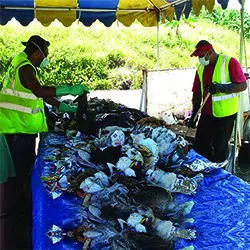

To design and monitor a solid waste program effectively, it is necessary to assess disposal practices and understand the content of the waste stream. Waste characterization studies, or waste composition studies and audits, supply this necessary information. Data gathered during waste sampling can present a complete picture of disposal, which we use to:

SCS Engineers developed the first national methodology for conducting waste composition studies for the U.S. Environmental Protection Agency.
This same methodology was subsequently used as the basis for the ASTM Standard D5231-92 (1990,’94, ’98) – “Standard Test Method for Determination of the Composition of Unprocessed Municipal Solid Waste,” which is widely recognized as the national standard.
SCS Engineers is one of a select number of firms that have conducted waste-characterization studies to evaluate local, regional, and national trends. The scope of SCS’s projects ranges from informal, single-site “waste audits” to state-wide waste generation studies that incorporate disposal and diversion activities.
SCS’s waste characterization studies can:
Watch an educational video featuring regional and state studies and how they are used to lower GHG, improve recycling programs, plan for infrastructure, and improve collections to reduce contamination.